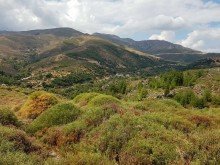In Crete, on holiday, and my mind returns to the question of the land…..The land question is most physically encountered in its boundaries, its prohibition and lack of access, if you like. The wire fence, the boundary ditch, the path you cannot walk, and so on. Even the goat, a most agile defier of physical obstructions, is tied to the divided land and its human custodians. Here, it is the peasantry; there is a subtle overlay between the rural proletariat and the peasantry here, since subsistence smallholding still exists and has, indeed, been bolstered by Greece’s economic crisis. Our hostess’ family have their own sheep and vegetables, which they process themselves for the food they make and sell in this taverna.
In Crete, and in most of the islands, the family smallholding has provided a buffer against the capitalist crisis. Young people have fled Athens and Thessalonica and returned to the soil and the taverna: tourism has acted to reinforce the peasantry here. The taverna and the smallholding have a deep relationship in the countryside, dotted along the walking routes, especially the E4, which straddles the length of Crete from its deep gorges to its fertile plateaux. Yesterday, we encountered , in the lobby of a small hotel, a sale of hand-made jewellery and gifts which its creator, and vendor had brought with him from his bankrupted Athens shop in his flight from economic crisis and EU punishment of Greece for daring to elect a (at the time) left wing government. The local peasant community, tourism-reliant, has provided a buffer against the destruction of the working class. It has also, by chance, taken ecologically friendly steps to reduce its reliance on expensive imported power: every house and taverna has its own solar Panels on the roof.
The land and rural peasantry situation is extremely different in Dorset. Here the rural proletariat is tiny and landholding almost absent. A few allotments in Dorchester provide gardening enthusiasts with a practical hobby. The young here FLEE the land to find sufficiently well-paid employment to survive. Many rural proletarians live in tied accommodation: owned in their entirety Last year, I asked my smartphone who owns most land in Dorset? I urge you to try it. Check Wikipedia! I think you will have little better luck than I. You will be referred to NATIONAL statistics of landholding by the Forestry Commission, the Ministry of Defence and of Pension Funds (which have more to do with making money on the stock exchange – the major ruling class Casino – than with paying pensions!). It will leave you none the wiser about landholding in Dorset. The MOD website largely evades the question, failing to mention that its portfolio includes stolen land in Tynham! The Land Registry requires payment, and even then can Bly answer specific questions about named properties. It will not give you a general picture. Investigate the names you know: you will find that the DRAX family holds a 7,000 acre estate, based on an ancient land grab donated by William the Bastard (he was a Bastard before he was a Conqueror!) and extensive dabbling in slavery. Grosvenor Estates holds 12,000 acres; but how many landlords’ names do you know? You will catch vague hints of Russian Oligarchs and Saud Princes: the class of oppressors is quite cosmopolitan and generously international. No concerns about migrants at this level!! The question of who owns the land is not easily answered. This is largely, I suspect, because those who own it are not anxious for the rest of us to know how damned much they have got! Wholly-owned subsidiaries of wholly-owned companies in substantial tax havens! In Dorset, unlike in Crete, the bourgeoisie and the aristocracy merged in an orgy of land ownership (theft) that displaced the peasantry into the open arms of the industrial factories. This was called the Enclosures and involved the open theft of common land. The proletariat was not attracted, or created: it was cashiered!
Today, monarchical Pomp & Circumstance is shamelessly employed in the preservation of a semi-landowning, and wholly capitalist class. Even the carrot of home ownership is a myth: the totality of land owned by home owners in Britain is less than 4% of national land ownership. The owning class, in all its secretive capitalist glory, owns the land. In Britain, there is no rural community to retreat to: it is fight back or be destroyed. The road to community lies through revolutionary reconstruction…
Tim Nicholls,
Dorset Socialists







